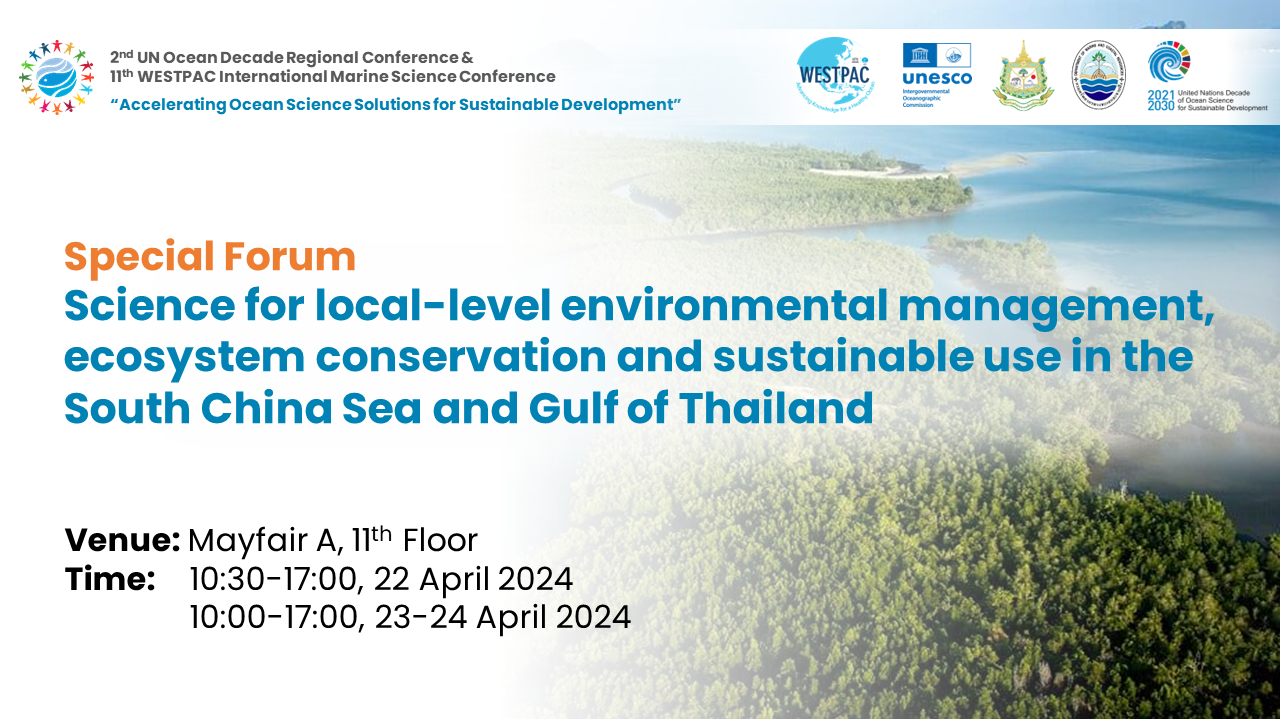 BANGKOK, 22 April 2024 — A critical forum kicks off today at the 2nd UN Ocean Decade Regional Conference and 11th WESTPAC International Marine Science Conference focusing on science-driven strategies for managing and preserving the rich ecosystems of the South China Sea and Gulf of Thailand and will run until 24 April at the Berkeley Hotel Pratunam in Bangkok, Thailand. The United Nations Environment Programme (UNEP) and United Nations Office for Project Services (UNOPS), funded by the Global Environment Facility (GEF), will convene the Special Forum that explores how scientific knowledge can translate into tangible environmental improvements.
BANGKOK, 22 April 2024 — A critical forum kicks off today at the 2nd UN Ocean Decade Regional Conference and 11th WESTPAC International Marine Science Conference focusing on science-driven strategies for managing and preserving the rich ecosystems of the South China Sea and Gulf of Thailand and will run until 24 April at the Berkeley Hotel Pratunam in Bangkok, Thailand. The United Nations Environment Programme (UNEP) and United Nations Office for Project Services (UNOPS), funded by the Global Environment Facility (GEF), will convene the Special Forum that explores how scientific knowledge can translate into tangible environmental improvements.
Scientists and representatives from the governments of Cambodia, China, Indonesia, Philippines, Thailand, and Vietnam, who are key stakeholders of the South China Sea and the Gulf of Thailand, as well as lead conservation experts from across the Asia Pacific region will gather to discuss sustainable development in the South China Sea. Over the course of three-days, they will share observations from multiple initiatives that have been conceived to boost the ‘blue economy' in the region’s most affected areas. Discussions will also cover the different challenges being faced by communities and ecosystems along Thailand’s coast, including the impact of tourism on the coral reef ecosystem around Koh Mak Island. Additionally, reports from fishermen operating in overlapping fishing areas and coastal dolphin habitats in the Middle Gulf of Southern Thailand will be presented. Attendees will also learn about reef coral decline and adaptive solutions for coral reef conservation in Nui Chua National Park in Vietnam.
The South China Sea is a biodiversity hotspot under increasing pressure from overexploitation, habitat degradation, and pollution. The Gulf of Thailand and the South China Sea are interconnected large marine ecosystems, sharing water, marine life, and even environmental threats. Their connection means that pollution or habitat loss in one can impact the other, underscoring the need for a unified management approach.
Mr. Anders Poulsen, Project Manager of the GEF/UNEP/UNOPS Implementing the Strategic Action Programme for the South China Sea and Gulf of Thailand (SCS SAP) Project said: “The outcomes of this forum have significant implications for safeguarding the South China Sea and Gulf of Thailand, contributing to regional and global ocean conservation efforts. It highlights that collaborative, science-based approaches are essential to ensure the sustainable use and protection of these essential marine resources for generations to come.”
Mr. Ukkrit Satapoomin, Director of Thailand's Marine Resources Conservation Division, Department of Marine and Coastal Resources (DMCR) of the Ministry of Natural Resources and Environment (MONRE) and the National Technical Focal Point of the SCS SAP Project also expressed: "As one of the six participating countries, Thailand is honored to host this important forum. The health of the Gulf of Thailand is inextricably linked to the South China Sea, and collaborative, science-based solutions are paramount. We are working alongside our regional partners to ensure a thriving future for these vital marine ecosystems."
The Special Forum underscores the UN Decade of Ocean Science for Sustainable Development, emphasizing collaboration between scientists, policymakers, and local communities.
Dr. Vo Si Tuan, Regional Science Coordinator of the SCS SAP Project and Co-Convener of the Special Forum likewise added: “The countries bordering this critical marine basin recognize the urgent need for action, working together through the SCS SAP Project, to implement solutions guided by science and regional cooperation.”





